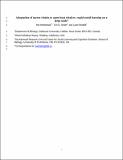Files in this item
Adaptation of sperm whales to open-boat whalers : rapid social learning on a large scale?
Item metadata
| dc.contributor.author | Whitehead, Hal | |
| dc.contributor.author | Smith, Tim D | |
| dc.contributor.author | Rendell, Luke | |
| dc.date.accessioned | 2021-03-19T11:30:12Z | |
| dc.date.available | 2021-03-19T11:30:12Z | |
| dc.date.issued | 2021-03-17 | |
| dc.identifier | 273398458 | |
| dc.identifier | 19b1f497-3c3c-44eb-b987-b637cc9c07e1 | |
| dc.identifier | 33726561 | |
| dc.identifier | 85103143055 | |
| dc.identifier | 000629928800001 | |
| dc.identifier.citation | Whitehead , H , Smith , T D & Rendell , L 2021 , ' Adaptation of sperm whales to open-boat whalers : rapid social learning on a large scale? ' , Biology Letters , vol. 17 , no. 3 , 20210030 . https://doi.org/10.1098/rsbl.2021.0030 | en |
| dc.identifier.issn | 1744-9561 | |
| dc.identifier.other | ORCID: /0000-0002-1121-9142/work/90952334 | |
| dc.identifier.uri | https://hdl.handle.net/10023/21663 | |
| dc.description.abstract | Animals can mitigate human threats, but how do they do this, and how fast can they adapt? Hunting sperm whales was a major nineteenth century industry. Analysis of data from digitized logbooks of American whalers in the North Pacific found that the rate at which whalers succeeded in harpooning ('striking') sighted whales fell by about 58% over the first few years of exploitation in a region. This decline cannot be explained by the earliest whalers being more competent, as their strike rates outside the North Pacific, where whaling had a longer history, were not elevated. The initial killing of particularly vulnerable individuals would not have produced the observed rapid decline in strike rate. It appears that whales swiftly learned effective defensive behaviour. Sperm whales live in kin-based social units. Our models show that social learning, in which naive social units, when confronted by whalers, learned defensive measures from grouped social units with experience, could lead to the documented rapid decline in strike rate. This rapid, large-scale adoption of new behaviour enlarges our concept of the spatio-temporal dynamics of non-human culture. | |
| dc.format.extent | 5 | |
| dc.format.extent | 397501 | |
| dc.language.iso | eng | |
| dc.relation.ispartof | Biology Letters | en |
| dc.subject | Social learning | en |
| dc.subject | Culture | en |
| dc.subject | Sperm whale | en |
| dc.subject | Whaling | en |
| dc.subject | Defensive measures | en |
| dc.subject | GC Oceanography | en |
| dc.subject | QH301 Biology | en |
| dc.subject | DAS | en |
| dc.subject.lcc | GC | en |
| dc.subject.lcc | QH301 | en |
| dc.title | Adaptation of sperm whales to open-boat whalers : rapid social learning on a large scale? | en |
| dc.type | Journal article | en |
| dc.contributor.institution | University of St Andrews. School of Biology | en |
| dc.contributor.institution | University of St Andrews. Centre for Social Learning & Cognitive Evolution | en |
| dc.contributor.institution | University of St Andrews. Centre for Biological Diversity | en |
| dc.contributor.institution | University of St Andrews. Sea Mammal Research Unit | en |
| dc.contributor.institution | University of St Andrews. Bioacoustics group | en |
| dc.contributor.institution | University of St Andrews. Marine Alliance for Science & Technology Scotland | en |
| dc.identifier.doi | https://doi.org/10.1098/rsbl.2021.0030 | |
| dc.description.status | Peer reviewed | en |
This item appears in the following Collection(s)
Items in the St Andrews Research Repository are protected by copyright, with all rights reserved, unless otherwise indicated.

